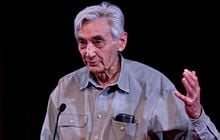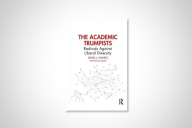You have /5 articles left.
Sign up for a free account or log in.

Howard Zinn
Wikipedia
Howard Zinn for decades enjoyed sparring with people in authority. So if it weren’t for the fact that Zinn is dead, he might well enjoy knowing that the president of Purdue University spent some of his time Wednesday denouncing his work.
Mitch Daniels, the Purdue president, was the subject of an Associated Press article Tuesday afternoon based on e-mail exchanges Daniels and staffers had while he was governor of Indiana. In those exchanges – which came shortly after Zinn died in 2010 – Daniels wanted to be assured that Zinn wasn’t being taught in the state, and he discussed trying to make sure that university courses used to train teachers didn’t include Zinn’s works. In fact, to Daniels’s distress, some of these programs were using Zinn’s work.
It appears that despite those e-mail exchanges, no one told the state’s faculty members to stop teaching Zinn. But Daniels's interest in doing so – in one e-mail he said "This crap should not be accepted for any credit by the state” – has alarmed many academics, who wonder why a governor would want to make books off-limits.
In an interview with Inside Higher Ed Wednesday morning and in a statement he issued later in the day, Daniels stressed that his concern about Zinn related to the state’s elementary and secondary schools – and not wanting teachers to be advancing Zinn’s views there. In his statement Wednesday afternoon, Daniels went after Zinn again.
“I merely wanted to make certain that Howard Zinn's textbook, which represents a falsified version of history, was not being foisted upon our young people in Indiana's public K-12 classrooms,” Daniels said in the statement. “No one need take my word that my concerns were well-founded. Respected scholars and communicators of all ideologies agree that the work of Howard Zinn was irredeemably slanted and unsuited for teaching to schoolchildren.”
Daniels went on to quote Arthur M. Schlesinger as calling Zinn “a polemicist, not a historian." And he noted that Michael Kazin said of Zinn’s work that it was "bad history, albeit tilted with virtuous intentions.”
The Purdue board also issued a statement Wednesday, denouncing the AP article and backing Daniels.
"What we see is a complete misrepresentation of President Daniels' views and concerns. The exchange had nothing to do with academic freedom or censorship. Rather, it had to do with concerns over what is being taught in Indiana’s K-12 public schools,” said the statement. “In his leadership role at Purdue University, President Daniels has stated and demonstrated his complete commitment to freedom of inquiry and has been an emphatic voice for that freedom. The board rejects as totally misleading the original article and reaffirms its unanimous and complete support of President Daniels.”
A survey of articles and analysis of Zinn suggests that Daniels certainly is correct to say that many historians (and not just those on the right) accused Zinn of oversimplifying, especially in his most widely read work, A People’s History of the United States. But what the Daniels critique doesn’t include is that many of these historians agreed with Zinn’s premise that American history as traditionally taught represents far too narrow a set of perspectives.
Zinn’s obituary in The New York Times credited A People’s History with broadening the public perceptions of American history, and with making history relevant to many more people.
“Almost an oddity at first, with a printing of just 4,000 in 1980, A People’s History of the United States has sold nearly two million copies. To describe it as a revisionist account is to risk understatement. A conventional historical account held no allure; he concentrated on what he saw as the genocidal depredations of Christopher Columbus, the blood lust of Theodore Roosevelt and the racial failings of Abraham Lincoln. He also shined an insistent light on the revolutionary struggles of impoverished farmers, feminists, laborers and resisters of slavery and war. Such stories are more often recounted in textbooks today; they were not at the time.”
The obituary noted the criticisms and praise of Zinn from historians, in which critiques touch on the issues raised by Daniels, but also credit Zinn. The obituary quoted Sean Wilentz, a Princeton University historian as saying: “What Zinn did was bring history writing out of the academy, and he undid much of the frankly biased and prejudiced views that came before it…. But he’s a popularizer, and his view of history is topsy-turvy, turning old villains into heroes, and after a while the glow gets unreal.”
A key point in understanding Zinn may also be that such criticism didn’t bother him, as he said repeatedly that his goal wasn’t to be unbiased, but to offer American history with a different set of biases. He told the Times of his People’s History: “It’s not an unbiased account; so what? If you look at history from the perspective of the slaughtered and mutilated, it’s a different story.”
Some recent criticism of Zinn has suggested that the popular view of him as the person who broke down all the old hagiography in American history overstates his role – at least within the profession.
In an essay last year in The New Republic, David Greenberg – a professor of media studies and history at Rutgers University – describes the impact A People’s History made on him as a teenager, and the surprise to him later to find out that plenty of historians had challenged the triumphal view of American history before Zinn’s huge success with his survey history.
“What I didn’t realize was that the orthodox version of the American past that Howard Zinn spent his life debunking was by the 1980s no longer quite as hegemonic as Zinn made out,” Greenberg wrote. “True, in the popular books and public ceremonies of the 1980s, you could still find a whitewashed tale of the nation’s past, as you can today; and many cities around the country shielded their charges from such heresies. But as far as historians were concerned, the sacred cows that Howard Zinn was purporting to gore had already been slaughtered many times.” (The essay, quite critical of Zinn, drew responses from defenders.)
Within academe, Zinn also played a role challenging powerful presidents – at Spelman College early in his career and at Boston University, where he fought battle after battle with John Silber.
The battles with presidents past or at Purdue today also don’t reflect the extent to which he was influential with many students, who say he inspired them.
Marian Wright Edelman, president of the Children's Defense Fund, whom he taught at Spelman, wrote after Zinn’s death, of his impact on her.
“Howie taught me to question and ponder what I read and heard and to examine and apply the lessons of history in the context of the daily political, social and moral challenges all around us in the South, such as racial discrimination and income inequality,” she wrote. “He listened and answered questions as we debated strategies for conducting sit-in demonstrations to challenge segregated public dining facilities and used his car to check out, diagram, and help choreograph planned civil rights events. In short, he was there for and with us through thick and thin, focused not just on our learning in the classroom but on our learning to stand up and feel empowered to act and change our own lives.”
Defining Legitimate Criticism
Much of the discussion has focused on when criticism is legitimate and when it crosses a line. Daniels told Inside Higher Ed of Zinn: "No one credible defended his versions of history, and neither does academic freedom confer an entitlement to have one's work used in the K-12 public system."
Some commentators have picked up on that theme. The College Fix, a conservative blog about higher education, wrote of the Daniel's e-mail exchanges: "Sounds like responsible governorship, but the AP billed it as going against his current stance in support of academic freedom as a university president. Is not supporting a severely distorted version of history the same as not supporting academic freedom? Hardly."
But John Tirman said academics should take note that Daniels, in the e-mail to his staff while he was governor that set off the exchanges, referred to Zinn as a "terrible anti-American academic." Tirman is executive director and principal research scientist at the Massachusetts Institute of Technology Center for International Studies.
In an e-mail, he said that "Zinn, who I knew and admired, never hid his biases. He often said very clearly that he was representing voices and perspectives that had been excluded from the 'great man' approach to history.... His history 'from below' changed historiography for good."
Tirman added: "As to the anti-American canard, I see this as the last refuge of a politician who is quite ignorant of the discourses in many quarters of American intellectual and activist life. Zinn often appealed to judge American actions by the principles of the founders and those who we all agree brought progress to the social and political freedoms and responsibilities we now take for granted. When U.S. political leaders fell short of adhering to those ideals, Zinn was powerfully and incisively critical, and very often right -- on Vietnam, race relations, women's empowerment, the Iraq War, etc. Daniels does not understand that a vibrant civil society has many voices, many perspectives. To be contrary to the old mainstream construction of history is not equivalent to being anti-American. That should be obvious, but to a politician who still seems to be campaigning for something, it never will be. His unsuitability to be Purdue's president is glaring."









